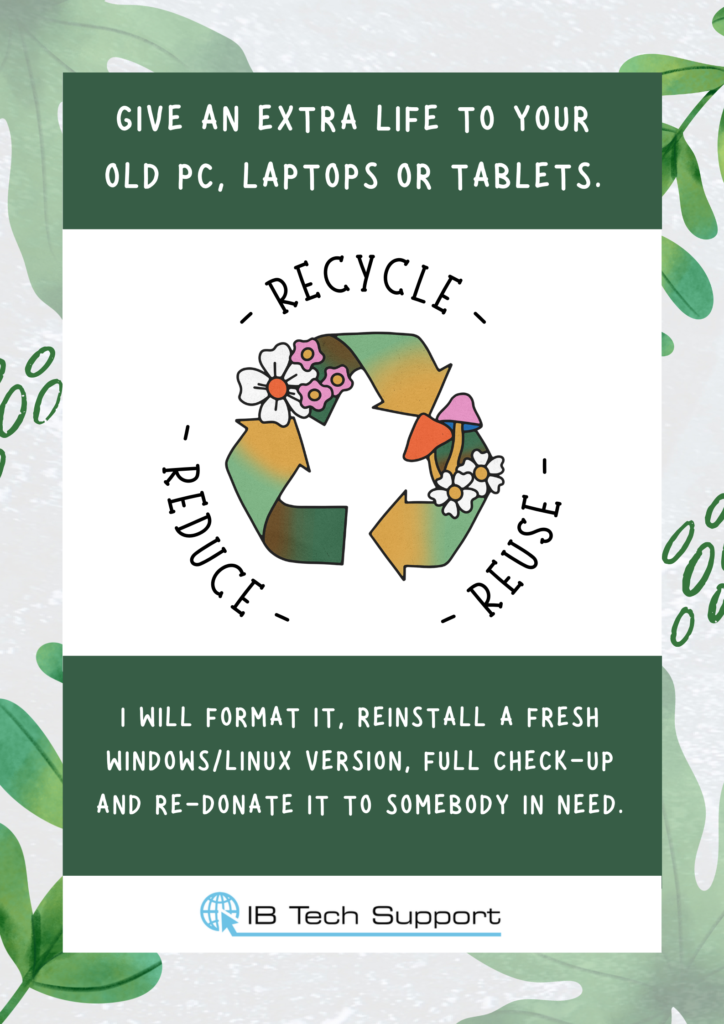Recycle Reduce Reuse
Recycle, Reduce, Reuse: Earth-Friendly Tips
Why Recycle old devices?
The Imperative of Recycle, Reduce, and Reuse
We live in a world where natural resources are finite and pollution is rampant. We need to change our consumption and production patterns to ensure a sustainable future for ourselves and the planet. One way to do this is to follow the 3Rs’ principle: recycle, reduce, and reuse.
What are the 3Rs?
The 3Rs stand for recycle, reduce, and reuse. They are meant to be a hierarchy, arranged in ascending order of their environmental impact from low to high. This means that the most preferable option is to reduce the amount of waste we generate, followed by reusing the materials we have, and finally recycling them into new products.
- Reduce means to purchase less ‘stuff’ and to use less energy and water. This can help us save money, conserve resources, and minimize the amount of waste we produce. Some examples of reducing are: buying durable and long-lasting products, avoiding single-use items, turning off lights and appliances when not in use, and taking shorter showers.
- Reuse means to use the same material more than once for the same or a different function. This can help us extend the lifespan of products, reduce the need for new materials, and save energy. Some examples of reusing are: using food containers and bottles instead of throwing them out, donating or swapping clothes and books, and repairing or refurbishing items instead of replacing them.
- Recycle means to collect and process waste materials into new products. This can help us reduce the amount of waste that goes to landfills, conserve natural resources, and save energy. Some examples of recycling are: separating waste into different bins, composting organic waste, and buying products made from recycled materials.
Why are the 3Rs important?
The 3Rs are important because they can help us achieve the following benefits:
- Environmental benefits: The 3Rs can help us reduce greenhouse gas emissions, conserve natural resources, prevent pollution, and protect biodiversity. By recycling, we can save up to 95% of the energy that would be used to make new products from raw materials2. By reducing and reusing, we can prevent waste from being generated in the first place, which can reduce the need for landfills and incinerators.
- Economic benefits: The 3Rs can help us save money, create jobs, and boost innovation. By reducing, we can lower our expenses on energy, water, and goods. By reusing, we can extend the value of our products and avoid buying new ones. By recycling, we can create new markets and industries for recycled materials and products.
- Social benefits: The 3Rs can help us improve our health, well-being, and quality of life. By reducing, we can avoid exposure to harmful chemicals and toxins that are present in some products and waste. By reusing, we can foster a sense of community and sharing through donation and exchange. By recycling, we can educate ourselves and others about the importance of environmental responsibility and stewardship.
How can we practice the 3Rs?
The 3Rs are not only a principle, but also a practice. We can practice the 3Rs in our daily lives by making simple choices and changes. Here are some tips on how to practice the 3Rs:
- Reduce: Before buying something, ask yourself if you really need it, if you already have something similar, and if you can borrow or rent it instead. Choose products that have less packaging, are made from renewable or recycled materials, and are energy-efficient and water-saving. Avoid disposable items such as plastic bags, straws, cups, and cutlery, and bring your own reusable alternatives. Plan your meals and shopping lists to avoid food waste, and store your food properly to extend its shelf life.
- Reuse: Before throwing something away, ask yourself if you can use it again, if you can give it to someone else, or if you can repurpose it into something else. Use both sides of paper, reuse envelopes and boxes, and refill bottles and jars. Donate or sell your unwanted clothes, books, toys, and furniture, or swap them with your friends and family. Repair or refurbish your broken or old items, or get creative and make something new out of them.
- Recycle: Before disposing of something, check if it can be recycled, and if so, how and where. Follow the local recycling rules and guidelines, and sort your waste into the appropriate bins. Compost your organic waste, such as fruit and vegetable peels, eggshells, coffee grounds, and tea bags, and use it as fertilizer for your plants. Buy products that are made from recycled materials, and look for the recycling symbol on the packaging.
Conclusion and Initiative
The 3Rs are a simple but powerful way to reduce our environmental impact and improve our quality of life. By practicing the 3Rs, we can make a positive difference for ourselves, our community, and our planet. The 3Rs are not only a principle, but also a practice. Let’s start today and make the 3Rs a part of our daily routine. Remember: recycle, reduce, and reuse. It’s imperative for our future.
After this little point of view about why is important to recycle I’m here to promote this new initiative that will involve IBTechSupport.com if you have any old or broken laptop, computer, smartphone or tablet that you don’t need or don’t want anymore get in touch with me and I will be very happy to take, repair and donate!
Let’s give an extra life to old devices.
I will format it, reinstall a fresh OS, full check-up and I will donate to somebody in need.
Get in touch now!

TESTIMONIALS

